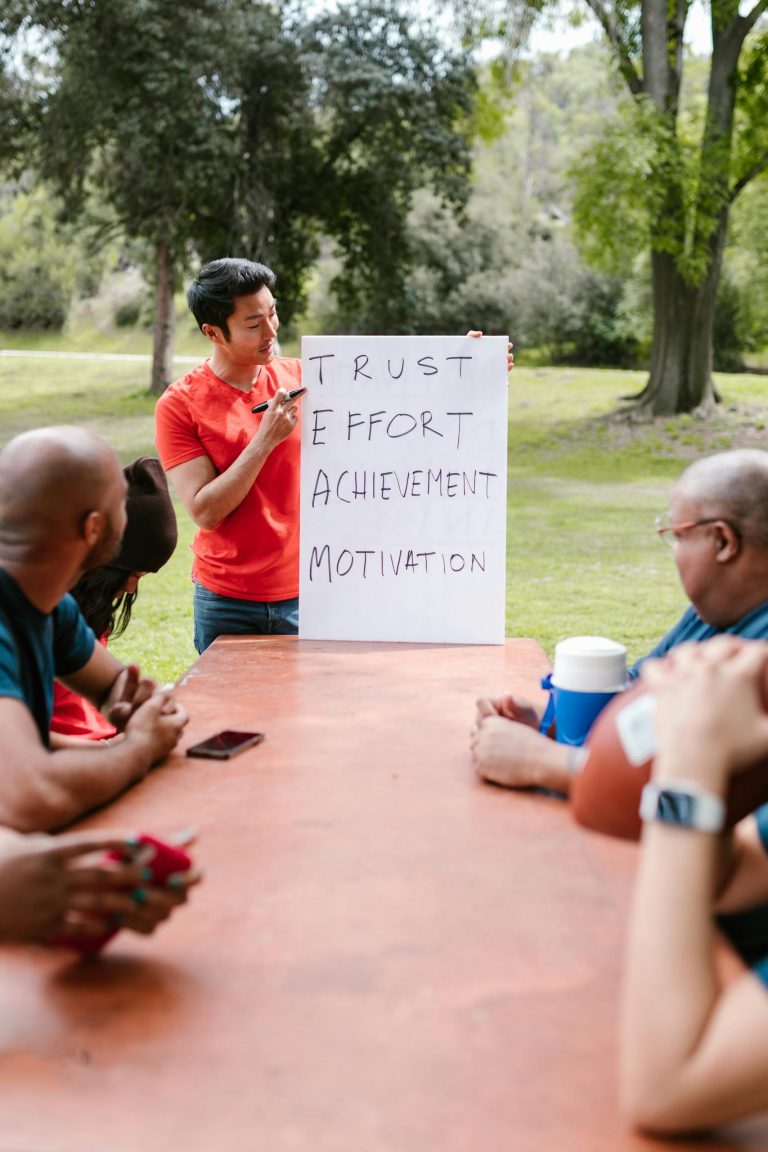Blog
Join us in shaping the future of leadership.-
Ensuring Equity and Inclusion in Remote Work Settings
Have you ever wondered if everyone on your team feels equally included and valued in a remote work setting? If you have, you’re not alone. The shift towards remote and hybrid work has introduced numerous advantages for organizations—flexibility, productivity boosts, and access to a broader talent pool. Yet, this shift is not without challenges. One…
-
Leveraging Technology for Effective Remote Leadership
Today’s leadership landscape has evolved dramatically. Remote teams, once the exception, have become the norm—ushering in a new set of leadership challenges. How do you nurture trust, maintain accountability, and inspire collaboration when your interactions primarily occur through screens? The answer lies in effectively leveraging technology—not merely as a productivity tool, but as a fundamental…
-
Maintaining Company Culture with a Distributed Workforce
Imagine this scenario: your team used to gather around coffee machines, collaborate effortlessly during spontaneous hallway conversations, and celebrate wins in person. Fast-forward to today—your team is scattered across several time zones, connecting through screens. Without careful nurturing, your once-thriving company culture risks fading into a distant memory. How do effective leaders tackle this challenge…
-
Fostering Collaboration in a Hybrid Work Environment: Bridging the Distance
The hybrid work model has rapidly emerged as the new standard for many organizations, blending the flexibility of remote work with the benefits of in-person interaction. While offering significant advantages in terms of employee autonomy and talent access, it also introduces unique complexities, particularly when it comes to fostering seamless collaboration. The challenge for leaders…
-
Managing Remote Teams: Best Practices for Leaders
The landscape of work has fundamentally shifted. Remote work, once a niche option, has become a core component of many business models, bringing with it both unprecedented flexibility and unique leadership challenges. For leaders, the transition from managing in-person teams to overseeing distributed workforces demands a fresh set of skills and a thoughtful re-evaluation of…
-
Measuring the Impact of DEI Initiatives: From Intent to Tangible Results
In today’s progressive workplaces, Diversity, Equity, and Inclusion (DEI) initiatives are widely recognized as essential. However, merely implementing programs isn’t enough; true impact comes from strategically measuring their effectiveness. The shift is moving from “why DEI is important” to “how well are our DEI efforts actually performing?” Measuring the impact of DEI initiatives is crucial…
-
The Business Case for Diversity and Inclusion: Unlocking Performance and Innovation
In today’s rapidly evolving global marketplace, businesses face unprecedented challenges, from intense competition and digital disruption to the relentless pursuit of top talent. Traditional approaches to leadership and organizational structure are often insufficient to navigate this complexity. Forward-thinking leaders are recognizing that a truly diverse and inclusive workforce is no longer merely a moral imperative…
-
Building Inclusive Teams: Strategies for Leaders
Inclusive teams aren’t just created—they’re cultivated intentionally. The modern workplace thrives on diversity, equity, and inclusion, but integrating these into daily leadership practices takes more than good intentions. It requires purposeful action, genuine empathy, and clear accountability. But what does it mean, practically, to build an inclusive team? How can leaders truly ensure that every…
-
Unconscious Bias: Recognizing and Addressing It in the Workplace
Have you ever paused to wonder why you gravitate toward certain employees, favor specific ideas, or unintentionally overlook others? Welcome to the subtle and pervasive world of unconscious bias—a hidden influencer shaping workplace decisions more powerfully than many leaders realize. Unconscious biases are automatic judgments and stereotypes we unknowingly harbor. While often unintended, these biases…
-
Integrating DEI Principles into Leadership Practices: Building a Stronger, Inclusive Team
Today’s organizational leaders understand that diversity, equity, and inclusion (DEI) aren’t just nice-to-haves—they’re essential drivers of innovation, team cohesion, and sustained success. Yet, many leaders still find themselves asking: “How do I truly integrate DEI principles into my everyday leadership?” Here’s your practical roadmap to authentically embedding DEI into your leadership practice, building trust, and…
-
Case Study: Successful Change Management in Action
Imagine this: An organization stagnant from years of business-as-usual practices embarks on a sweeping transition to keep pace with industry innovation. Employees, comfortable in their status quo, initially respond with skepticism, worry, and even outright resistance. Now fast-forward six months later: those same employees are energized, confident, and deeply committed to the new direction. Sounds…
-
The Psychology of Change: Supporting Employees During Transitions
Change is rarely easy. It disrupts patterns, reshapes expectations, and can trigger emotional turbulence—even among the most adaptable employees. Yet change remains a constant companion in today’s evolving workplace. How can leaders support their teams through transitions, recognizing the psychology behind reactions and fostering resilience? Understanding the psychological undercurrents of change is transformative. When leaders…
-
Overcoming Resistance to Change: Leadership Techniques for Success
Resistance to change is one of the most universal—and frustrating—challenges for any leader. Change, by its nature, disrupts routines, breeds uncertainty, and triggers anxiety. Imagine you’ve just introduced a new platform intended to revolutionize productivity, only to be met by crossed arms, skeptical stares, and whispered doubts around the conference room. Frustrating, isn’t it? But…
-
Communicating Change Effectively to Your Team: A Leader’s Essential Playbook
Change is exciting—until it’s not. Imagine you’ve spent weeks meticulously planning a major organizational shift. You’ve dotted your i’s, crossed your t’s, and finally, it’s time to break the news to your team. But instead of excitement, you’re faced with confusion, resistance, and a sea of anxious faces. Where did things go wrong? As leaders,…
-
Leading Through Organizational Change: A Leader’s Guide
Change is inevitable. But organizational change? That’s a storm very few leaders feel truly prepared to weather. Picture this: You’ve just announced a major restructuring, and your best employee’s eyes glaze over with uncertainty. A team once thriving in harmony now seems disoriented and anxious. Sound familiar? Navigating teams through uncharted waters is the true…
-
Balancing Empathy and Accountability as a Leader
Picture this familiar scenario: A valued team member repeatedly misses deadlines. As a leader, you’re torn. Do you extend empathy, understanding that personal struggles might be impacting performance? Or do you firmly enforce accountability and insist that deadlines be met regardless of personal circumstances? Leaders frequently find themselves wrestling with this dilemma—caught in the tension…
-
Building a Motivating Work Environment: Leadership Strategies
We’ve all seen it happen: teams start strong, fueled by enthusiasm and shared objectives, only to gradually lose momentum and energy. Before you know it, the same team that once brimmed with creativity and motivation becomes disengaged, unproductive, and uninspired. As a leader, it’s easy to feel powerless watching this shift, but here’s the good…
-
Addressing Burnout: Leadership’s Role in Employee Well-being
Have you ever witnessed a once-driven, engaged employee suddenly begin to withdraw, grow irritable, or display signs of exhaustion? Perhaps you’ve even experienced it yourself. Burnout is becoming a pervasive issue in today’s fast-paced workplaces, affecting productivity, morale, and overall team health. Leaders across industries face a crucial challenge: addressing burnout proactively while sustaining high…
-
Creating a Culture of Continuous Feedback
Continuous feedback refers to the ongoing exchange of observations, praise, and suggestions designed to help individuals and teams learn, adapt, and grow in real time. Unlike traditional annual reviews, continuous feedback is woven into the daily fabric of workplace interactions—whether during a project debrief, a quick check-in, or a spontaneous moment after a meeting. It’s…
-
Recognizing and Rewarding Employees: Best Practices
Imagine this: your top-performing employee, one who consistently goes above and beyond, quietly hands in their resignation. You’re shocked. Why didn’t you see it coming? Often, the underlying issue isn’t salary or workload, but rather a lack of genuine recognition and meaningful reward. For leaders and managers, recognizing and rewarding employees isn’t just a perk—it’s…
-
Strategies to Boost Employee Engagement in a Hybrid Work Environment
Picture a typical Monday morning: Some team members log in from bustling cafés or cozy home offices, while others step into the familiar hum of your headquarters. Hybrid work, once a temporary experiment, is now a permanent reality for many organizations. Although this new model offers unprecedented flexibility, it brings unique challenges, especially when it…
-
The Impact of Coaching on Employee Performance and Retention
Imagine two different organizations. In the first, employees grind through their tasks, feeling disconnected and stagnant in their roles. Turnover is high, motivation is low, and performance rarely rises above mediocrity. In the second organization, employees are actively engaged, continuously improving, and excited about their professional growth. People genuinely want to stay and contribute. The…
-
Developing Future Leaders: Succession Planning Strategies
Let’s be honest: most leaders don’t wake up eager to talk about succession planning. It often feels distant, awkward, or even a bit uncomfortable. After all, openly discussing who will take your place someday isn’t exactly intuitive. However, developing future leaders is not an exercise in replacing yourself—it’s about creating sustainability, innovation, and lasting excellence…
-
Providing Constructive Feedback: Techniques for Leaders
We’ve all been there—attempting to deliver feedback that lands the wrong way, leaving both parties frustrated and causing unintended tension. Constructive feedback is a cornerstone of effective leadership. Done well, feedback can transform teams, enhance performance, and foster a culture of continuous improvement. Done poorly, it’s a recipe for resentment and disengagement. Understanding how to…
-
Mentorship vs. Coaching: Understanding the Differences
Think back to a time in your career when you faced a tough decision or struggled with clarity about your professional path. Perhaps you reached out to someone more experienced for guidance, or maybe a manager provided you with structured feedback and action steps. While both scenarios might have helped you tremendously, did you know…
-
Implementing a Successful Coaching Culture in Your Organization
For leaders, managers, and professionals aiming to unleash potential and boost performance across their teams, the concept of a coaching culture is crucial. In this article, you’ll learn what a coaching culture entails, explore the common challenges organizations face when adopting this approach, and gain clear, actionable strategies to embed effective coaching practices into your…
-
Developing Emotional Intelligence for Effective Leadership
Have you ever found yourself frustrated by a team that feels disconnected or unresponsive, despite your best intentions as a leader? Perhaps you’ve wondered why your feedback isn’t landing well, or why motivation levels fluctuate unpredictably. You’re not alone. Many leaders experience these challenges, often overlooking a crucial component of successful leadership: emotional intelligence. In…
-
The Core Principles of Servant Leadership in Modern Organizations
A few years ago, I worked under a manager who didn’t talk much during meetings. Instead, he asked questions. He cleared blockers. He followed up quietly, gave credit publicly, and gave support privately. It took me a while to realize: he wasn’t trying to “lead from the front”—he was leading from behind. That’s when I…
-
Understanding Situational Leadership: How to Adapt Your Style to Fit Your Team
When I first became a manager, I thought I had to be consistent. Clear, firm, maybe even a little hands-off—after all, no one likes a micromanager. But a few weeks in, I realized something wasn’t working: some people were lost without direction, others were frustrated by too much of it. That’s when I learned my…
-
The Role of Trust in Building High-Performing Teams
Have you ever been part of a team where members hesitate to share ideas openly, fear admitting mistakes, or hold back from collaboration due to mistrust? As a leader, you may wonder why some teams excel effortlessly, while others struggle despite abundant resources and skills. The answer frequently lies in one simple yet profound concept:…






























